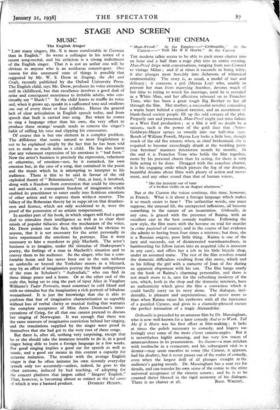THE CINEMA
" Man-Proof." At the Empire—" Gribouille." At the Curzon—" Tell Me if it Hurts." At the Curzon
Tux modern talkie seems to be able to pack more chatter into an hour and a half than a stage play into an entire evening. Man-Proof drips with conversations, ranging from neo-Coward to vintage Milne ; and if at times it succeeds in being witty, it also plunges most horribly into Acherons of whimsical sentimentality. The story is, as usual, a model of tact and delicacy ; it concerns a girl (Myrna Loy) who, unable to prevent her man from marrying Another, devotes much of her time to trying to wreck his marriage, until he is revealed as a White Man, and her affections rebound on to Franchot Tone, who has been a great tough Big Brother to her all through the film. Her mother, a successful novelist concealing a warm heart behind a cynical exterior, and an. assortment of blank-faced society people fill up the odd corners of the plot. Properly cast and presented, Man-Proof might just miss failure as a West End production ; as a film it will no doubt be a success, such is the power of the gold dust that i letro- Goldwyn-Mayer sprays so sweetly into our half-shut eyes. Bereft of William Powell, Myrna Loy looks a little lost, though much of the old fire returns when, as chief bridesmaid, she is required to become exceedingly drunk at the wedding party (our heroines' manners deteriorate month by month). In the end it is Franchot Tone -who holds the film together, more by his personal charm than by acting, for there is very little acting to be done. Drugged with the ceaseless chatter, it is his engaging smile which pierces the fog of our dreams, beautiful dreams about films with plenty of action and move- ment, and any other sound than that of human voices,
" like the insistent out of tune of a broken violin on an August afternoon."
But at the Curzon the voices continue, this time, however, in French. What is it about a foreign language which makes it so much easier to bear ? The unfamiliar words, one must suppose, the unusual lilt, the unexpected inflexions, all become something in the nature of an incantation. Gribouille, in any case, is graced with the presence of Raimu, with an excellent cast in the best comedy tradition. Following the new style, the film starts with the heroine on trial for murder (a crime passionel of course), and in the course of her evidence the admits to having been four times a mistress; but then, she is a Russian emigree, poor little thing. Raimu is one of the jury and succeeds, out of disinterested warmheartedness, in bamboozling his fellow jurors into an acquittal (she is innocent in any case), and offers her a job in his little bicycle shop, under an assumed name. The rest of the film revolves round the domestic difficulties resulting from this move, which end in his felling the girl with a statuette of Joan of Arc during an apparent elopement with his son. The film hangs neatly on the hook of Raimu's charming personality, and there is not much more to it, save for the refreshing modesty of the sets, which, both in the shop and the domestic interiors, have an authenticity which gives the film a conviction which it could hardly carry on its story alone. The dialogue, inci- dentally, is pleasant and unpretentious, and never more so than when Raimu raises his eyebrows with all the innocence of a puzzled Cyrano, and gives to a clumsily-phrased excuse the perfect intonation of a tragic Alexandrine.
Gribouille is preceded by an amateur film by Dr. Massingham, who is now well known for a later comedy And so to Work. Tell Me if it Hurts was his first effort at film-making ; it lacks at times the • polish necessary to comedy, and lingers too lovingly over some of the more c!ever camera-angles. • But it is nevertheless highly amusing, and has very few traces of amateurishness in its presentation. Its theme—a man stricken with toothache in a restaurant, and his subsequent visit to a dentist—may seem macabre to some (the Censor, it appears, had his doubts), but it never passes out of the realm of comedy, even when the largest drill of all plunges straight at the audience's gaping mouth. Dr. Massingham has a neat eye for details, and can transfer his own sense of the comic to the more universal acceptance of the cinema screen ; and he is to be counted thrice blessed in the rigid economy of his dialogue.














































 Previous page
Previous page